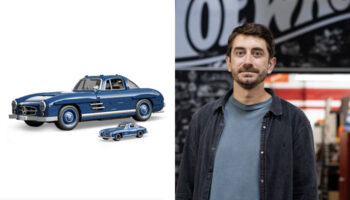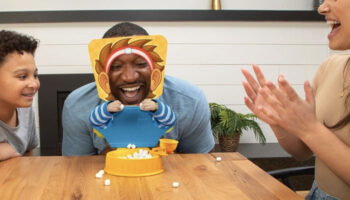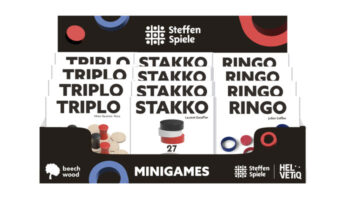Asmodee UK’s Jon Bruton on what he looks for in a product, mass vs. hobby and why quality isn’t enough

Jon Bruton is an Asmodee stalwart. We caught up with the Purchasing Executive to learn what he looks for in a game… And why passion and quality aren’t everything.
Thank you, Jon, for squeezing us in. Very good of you. For people that aren’t in the know, what is it that Asmodee does?
Asmodee Group is a group of companies consisting – primarily – of publishers and distributors; a little like an umbrella. At Asmodee UK, we’re a distribution business. Our role is based on fulfilling demand. We do also have marketing capacity which we use to help create or stimulate further demand, but basically we take product to retailers who then sell to consumers. And as part of that, Asmodee UK probably has the widest reach of any UK distributor within the games industry.
And my understanding is that you used to be a maths teacher? How did you go from teaching to King of Asmodee?
King of Asmodee! I don’t know about that! But I’ve always had a passion for games. Ever since I was younger, I played games. My parents live in Fleet and – when I was relatively young – I remember receiving games via mail order…
What sort of thing?
I started buying all the Avalon Hill games. They eventually opened a store in Aldershot, which was fairly close by. That meant I could cycle over to buy games: an early copy of Talisman and Dungeons & Dragons; things like this.

This was a regular thing?
Fairly, yes. As a customer, I got to know the owners of the shop. Then their son, Dan, started a games distribution business. So I’ve known the Esdevium family for years and years. When they started attending shows and showing games, I think I was their first demonstrator.
I had no idea! And how did this become a vocation?
It got to a few years ago and there was the opportunity! At the time, I loved teaching, but very much felt the stress. The advisor role came up in Asmodee… Although, having had the job offer, I turned it down three times!
Why was that?
I was unsure about moving away and very, very passionate about teaching. In the end, I took the decision thinking the Esdevium/Asmodee opportunity is never going to come up again… Whereas, I can go to teaching back any time.

Brilliant. You say you were probably Esdevium’s first demonstrator… I always think someone who physically sells product gets a deeper understanding of it. Is that your experience?
Yes, very, very much. I think games and inventions are always peoples’ passion, and – obviously – the number of times I’ve heard, “This is the next best thing since Scrabble.” And it’s not. It’s just a word game.
And you look to predict what really is the next best thing since Scrabble?
Yes, hopefully. I always liken predicting how well a game’s going to sell to predicting what a film’s going to be like… Some films with huge budgets behind them are massive box-office failures. Then there are sleeper hits… Look at Get Out by Jordan Peele.

Don’t let Mojo’s Billy Langsworthy know you’re a film fan… You’ll get dragged to so much rubbish! Honestly – it was a relief when the cinemas shut…
That bad?! It is quite a good analogy, I think. You can turn around and go, “Okay, Fantasy Flight Games – FFG – is the Marvel of games publishers.” You know when a Marvel film comes out, it’s going to be at a certain level… It’s going to be really big. But when Ant-Man came out, the question was, “Is it going to be as big as Thor? Or Captain America?” Because they’re better-known superheroes… It’s trying to judge that; knowing The Avengers would be the crème de la crème of the Marvel films, and FFG games is like that…
So what would be the Get Out of the games industry?
Things like Magic Maze, maybe… Games that are effectively from less well-known publishers. But they grow almost because of their quality, and they’re uniqueness. I always use that as an analogy, but I think the reality is that there are great games that don’t sell – and there are rubbish games that sell in huge quantities.
Yes! Well… Let us name no names! But knowing what’s going to sell isn’t based purely on quality, then?
No, it’s never just quality. The quality of the game gives something longevity, but commercial value on a game is probably less about gameplay and more about the entire packaging behind it. So having an idea as to what it is about the entire package is really important.
Let’s say I’ve come up with an idea, then, and I’m showing it to you. What is it you’re looking for to tell you whether it’s the next Avengers?
The starting bit is, is it good, and is it sellable. Past that, it depends what you’re looking for. If you’re looking for us to distribute a finished product, it’s quite different from working with you in the early stages… Before you go to print, say. We also want it to be good beyond a very-limited lifespan.

You mean you’re not interested in jumping on short-term trends?
No. As a business, I think one of the things that makes Asmodee unique is that we don’t want disposable products. We want brands that we can see grow over a period of time. A lot of mass-market toy-and-game manufacturers seem to have an adage: you lose money on the first container, and you lose money on the last container.
I’ve not heard anyone say that before! You’re making money on everything in between the first and last. This is a common adage?
Right. You very much pump in your marketing spend, which affects your first container. That’s out of the way… On your second container, you cover the marketing spend: you start to make money. But then some companies drop out because they’re disposable games! We want games that last longer, and are good to excellent quality.
And how does that quality affect price?
From a distribution point of view, we’re looking for a price point depending on the sector… If you’re looking at true mass market, it’s got to be a much sweeter price point. Hobby is much more flexible. Again, we’re also pragmatic that if you sell X copies of a £50 retail game, that’s better than twice as many copies of a £15 retail game.
Obviously, it’s looking at what market sector do you think a game would work? Is it unique? Is it going to play really, really well? Is it going to appeal to a core gamer? Or is it going to appeal to your average “man on the street”.
So when inventors come to you and say, “We’d like you to distribute this”, you don’t just take on anything. Where do you look?! And would you dare put a figure on how many ideas you do take on like that?
In terms of acceptance to rejections, it’s a very low acceptance rate. Probably about 1 in 10. Primarily, we look for people within the industry unless someone has a unique and really special idea. That’s because they understand a lot more, and something needs to be viable enough that you can reach enough independent stores to make it worth setting it up. Within mass, it’s much, much more competitive. At that point, when you’re talking larger volumes and larger investments.

Dealing with someone that’s brand new, it’s hard to know if there’s any demand. Obviously, we’re always very keen to work with people when we see a great product at a later stage of development. At that point, it’s really useful to say, “There’s a level of interest here…” We’d be really keen if there’s scope to work with somebody to finish off their product.
But there seems to be some confusion… Some people think if Asmodee is interested in a game, you’ll license it and do everything for them. So how often do you say, “Tweak this, this, and this and come back to us!”?
It’s quite interesting. Sometimes we do see something and say, “This is really good. We’d like to feed this back centrally.” That goes back to the whole thing about Asmodee as an umbrella. If you think of a distribution unit as being the spokes, you’re distributing on the outside and the core being the publishers…
The end of each of the spokes can be a way into the central umbrella. So we do have the odd product about which we liaise with the studio.
This is a bit out of the blue, but if you could wave a magic wand and communicate one thing to all inventors, what would it be?
One thing?! That’s really tough… First and foremost, make your game the best it can possibly be. That means playtest, playtest, playtest – and not just with your friends and family, because they’ll always be enthused. Blind playtest, and with a lot of other people. And as part of that, you have to listen to the feedback.
To get past your own enthusiasm, and that of the people you know…
Yes. This is something you can see with crowdfunding sites. There’s a ‘Cult of the New’… You get very few games that people back on Kickstarter, turn around and say, “This is awful.” Whereas six months later, there’ll be a lot of those games that everybody’s saying, “This is awful,”! But when people first get it, they say it’s amazing. That first group of people is too polite.
I know you have some interesting views on crowdfunding. I’d like to chat to you about that some time, too! But for now, may I infer there was a second piece of advice?!
The second thing I’d say can lead into the first… It’s to get advice from people in the industry and people in relevant positions. Obviously, Playtest UK is fantastic for making sure your game’s as good as it can be. People like us are helpful in terms of whether a game is commercially viable. You can have a fantastic game, but a fantastic game is often too complicated for mass market.

Really important to understand what’s happening if your mates say they love your game but industry feedback is very different…
You know, one of the things I’ve missed this year about not having the UK Games Expo. That’s one of my haunts. I always block time at Expo to go to the Playtest zone as a consumer, to get some playtests and give some feedback. You do get a lot of people go, “I disagree with you. I’ve played this. All my friends and family like it. I disagree with you.”
“No, no, no, no! YOU don’t get it!” You get that a lot?
I do! And I don’t explain; I don’t argue or say, “Look! I do get it! I got a degree in maths! I’ve got a fairly good idea of how to break a game down in terms of its constituent parts… I work for a very, very large game distribution business. I’ve got a personal collection of well over 1,000 games…” But I do like to think I’ve got a good idea of what works and what doesn’t.
You’re there incognito, presumably?
Yes, usually I won’t say who I am. But sometimes you can see someone has really got something, so then I might. Whether it’s something that’s going to work for us or someone else, you’d like to be able to be part of the process. Maybe I’ll give some advice and then, if there’s something that’s got real value, I might give my card but it’s very rare.
I’m curious then… What motivates you to go there? Is that altruism? Or a conscious decision to see what’s upcoming?
Part of it is I love games. I admire people that dedicate time to try and create. Part of it comes back from the whole root of going into teaching… That I want to see the best of people and – in teaching –you make a difference. I think there’s an element of giving somebody advice in a situation like that… Where I can give them some good advice. It’s altruistic in the end.

It sounds it, and you’re clearly a huge fan of games.
Right! I still spend a bit of every working week with people who are trying to get started, or giving advice to people. Someone that’s come in with a submission, maybe, and giving them a steer about improving the game, or sorting contacts, or games that they could draw on to get inspiration.
Talking in person like this, you sound very grounded; very sincere…
Part of it is just being involved in the industry. But funny you should say that: I had this fantastic quote from Adrian at Days of Wonder a couple of days ago… He always starts his emails, “Dear friends”. So I sent an email back to him and said, “One of the things I love, Adrian, is the way that you always say, “Dear friends”… It could sound so insincere but knowing you, it seems incredibly appropriate and heartfelt.” He replied saying, “That’s because it is sincere” and to the effect that people move into the games industry because they want to work with games – but they stay in the industry because of the friendships.
And is that your experience too?
Absolutely, yes… I think it’s a close-knit industry that’s incredibly supportive. Very few bad eggs, and I think for people on the periphery, or wanting to move in, it’s good to be able to give something back. I feel very privileged to do this role. I think, as part of that, there’s an opportunity to feed back to people that are in their early stages of the industry.
You spoke so eloquently there; I hope it comes across as well in the written word. When we first tied in I said one of the questions I was likely to ask was, “How has the board game market changed in the UK over the past 10 years?”…
Ha! And then it changed so massively in the last 10 months!
Right?! Now 10 years feels like a really odd question! So maybe the more relevant question now is: How has COVID impacted the UK games market?
I think that you can look at this in two bits… The UK games market had matured over the last 10 years. Games like Catan, Carcassonne and Ticket to Ride, games that were really niche only a couple of years ago, are much more significant now. Not mainstream, but significant… When I started teaching, there might be one person in the entire school that would know Ticket to Ride. When I left teaching in 2014, there were two or three kids that knew it in most of the classes I taught.

So over time, there’s been more awareness, and games are more socially acceptable because of things like The Big Bang Theory and so on. And I think there being more game shops and game cafes in high-street locations has also legitimised that games aren’t just Warhammer; they’re for families and events. I think we’ve seen more and more of that, and more awareness.
And the COVID part?
COVID has been really fascinating. I think the first reaction in the industry was this is going to be an absolute nightmare: people will have no money, they won’t have access, it’s going to be a disaster… But the first thing that happened was that online suddenly proliferated. The online sales in comparison to bricks and mortar sales, certainly the skew was very much higher to online – understandably.
The second thing is that established games that had been around for a period of time had a massive surge; absolutely huge. We know that in times of economic difficulty, analog games generally do very well because they’re good value for money, and there’s repeat play. And two-player games, a lot of the bit more-enquiring children’s games also do really well… Less disposable games; games you can invest more quality time with families have grown.

So we’ve been pleased in terms of the overall pickup. There have been fewer games published, and there’s less awareness of new and upcoming games… It’s been harder for the sleeper indie hits to get out. The big, established brands have secured their success because they’re what people know. We’ve noticed that with the likes of Shut Up & Sit Down and Dice Tower and things like this, there’s less buzz around new games because people aren’t attending shows. Effectively, the big companies who are marketing, have a good amount of followers are able to weather that storm. The smaller publishers find it a lot more difficult.
Right. We lost board-game cafes and clubs; we lost trade shows and demos… So the gulf between larger and smaller has grown…
Yes, I think it’s polarised. Big brands, successful games doing really, really well. Two-player games doing really, really well. Arty games have struggled because people aren’t socialising in the same way that they were previously.
So I suppose there are two final things. If you could have one question asked of you that you don’t normally get to talk about, what would it be?
Ooh, that’s a tricky one… There’s a piece of advice for inventors I was going to feed back to you that I hadn’t said early on. So the question, maybe, “Do you get influenced by your personal tastes?”
Great question! And DO you get influenced by your personal tastes?
No. Not at all.
Perfect! Thanks, Jon!
No, but the thing is people often say, “The only reason you’re saying you don’t like this product, or that one, is because that’s not your sort of game.” Because the presumption is that I like more involved games, that I’m not going to like this, or not going to understand it. And it’s not true. I’m very pragmatic. I like everything from simple, stupid games to really complicated games. I’ve got Corks sitting around at home! If I can enjoy that, I’m going to enjoy anything else.

So it’s fair to say you can have a broader vision than your own taste?
Yes. And one of the things I love about Essen is hunting down obscure Japanese and Korean games; things like that for my own personal collection. A lot of those I might love… But think I’d absolutely be committing commercial suicide to buy this for Asmodee. I think to be able to distinguish your own personal tastes from what you think is going to be commercially successful in either of your mass markets is brilliant.
Yes; the job is to see what’s commercial – not if it’s precisely your cup of tea!
The other piece of advice I think is important to get across is to avoid the trap of fudging your design by trying to please both markets. Because – too often – you have gamers that want to make something more mass-market… But because they’re gamers, they add in a few extra, complicated bits. Likewise, others might say, “This is incredibly complex – let’s tweak it for mass market…” So they end up on that middle ground, with a game that’s too complicated for mass, too simple for hobby. That’s a disaster. Too many people fall into that trap of trying to have something for everyone.
Out of interest, do you think it’s easier to fully transition one way or the other? Can hobby become mainstream? Or vice versa?
I think the Asmodee model has changed a little in the last couple of years which is quite interesting. We’re now looking more directly to mass-market, but traditionally, it’s been that games that succeed in the independent sector, the gems that are successful, do have an opportunity in the mass markets. But I think, yes, games can do both. If you look at Dobble’s success in the mass market, it’s incredible. Dobble started off in hobby and it still sells in hobby.
Great! Jon, I’m going to wrap this up with one last question. Thank you again for your time. You’ve been very, very generous. My final question is: What’s the most interesting thing in your office?
Oh! Well, I’m working from home at the moment, so my desk is very sparse here. I guess the the most interesting thing in my study… Oh, my goodness, I would say it’s a couple of magic tricks…
Oh, my days! You can’t just trail a magic trick! Let’s end the interview there, Jon; then you can show me the trick!
[Jon then does a piece of mind-reading, correctly divining which one of many, many Dobble-like doodles Deej chose]

—-
To stay in the loop with the latest news, interviews and features from the world of toy and game design, sign up to our weekly newsletter here





















